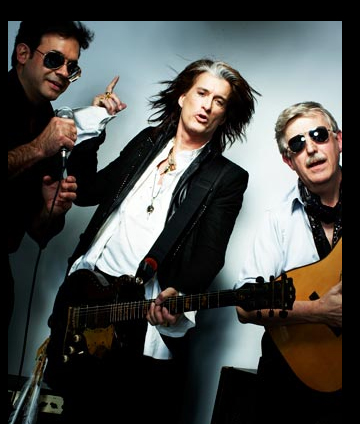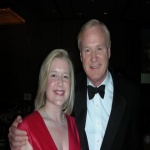April 22nd, 2010 by Peggy Polaneczky, M.D. in Better Health Network, Opinion, Research
No Comments »

 It’s only Wednesday, and so far three patients have come to their office visits carrying Cynthia Gorney’s article from Sunday’s New York Times entitled “The Estrogen Dilemma.”
It’s only Wednesday, and so far three patients have come to their office visits carrying Cynthia Gorney’s article from Sunday’s New York Times entitled “The Estrogen Dilemma.”
The article explores the stories of three women who found relief from perimenopausal symptoms by using hormone replacement, framing the discussion in the larger context of what is being called the “window hypothesis” — the idea that starting estrogen replacement in the perimenopause and continuing it into later life may be neuroprotective and even cardioprotective, in contrast to beginning its use 10 or more years after menopause, where it can trigger heart disease, stroke and dementia. Read more »
*This blog post was originally published at The Blog that Ate Manhattan*
September 24th, 2009 by Dr. Val Jones in Audio, News
No Comments »

Rudy Tanzi, Joe Perry, Francis Collins
I know. I was just as surprised as you are. Dr. Francis Collins, former director of the Human Genome Project, author of The Language Of God, and new director of the National Institutes of Health performed live in front of a group of Washington locals at the Capitol building today. He actually jammed with Aerosmith’s Joe Perry in an “unplugged” performance of Bob Dylan’s, “The Times They Are A Changin’.” This is not the kind of thing one expects in the hallowed halls of the Capitol building. But maybe it’s time to expect the unexpected?
I happened to have my reporter’s microphone with me in the audience so I recorded the song. The vocalist is Dr. Collins, Joe Perry does a guitar solo near the end, and Dr. Rudy Tanzi is on harmonica. The sound quality is… well… it’s what you’d expect from a hand-held microphone. But it’s worth a listen, just to get to know our new NIH director a little better!
[Audio:https://www.getbetterhealth.com/wp-content/uploads/2009/09/francis-collins.mp3]

Delta Goodrem
Australian pop star and cancer survivor Delta Goodrem followed Dr. Collins with this acapella beauty (again, forgive the sound quality):
[Audio:https://www.getbetterhealth.com/wp-content/uploads/2009/09/delta-goodrem.mp3]
A few things struck me about the event. First of all, Francis Collins is more of a “firecracker” than I expected. I read and reviewed his book recently, and his vivacious personality did not come through in its pages as well as it did on the stage with Joe Perry. He’s a fun-loving guy, a serious scientist, and very committed to advancing research and encouraging young people to rekindle their interest in discovery. That’s all very good news for America.
Secondly, I was touched by Joe Perry’s story about wanting to be a marine biologist when he grew up. Apparently he had a learning disability of some sort that was not addressed in school. For that reason, his test scores suffered and he looked for ways to excel outside of the classroom. His bright mind discovered an immediate affinity for music, and he poured himself into a career as a rocker. He still yearns for the ocean, though, and is a certified diver. As I looked at Joe, I kept thinking – my gosh, he might have been the next Jacques Cousteau if he had more help in school. But brilliance finds its own way to flourish – and Aerosmith became his outlet instead.
Thirdly, I realized that there are in fact a few congressmen with their heads screwed on straight when it comes to science. I had almost lost hope after watching video footage of Tom Harkin instructing scientists to validate his opinions rather than test whether or not certain things were true. Yikes. But the three co-chairs of the congressional biomedical research caucus, Reps Brian Bilbray, Mike Castle, and Rush Holt, seemed to truly understand some of the issues facing the advancement of medical research – and are determined to move America forward.
And finally, I noted that there wasn’t a single female or minority “rock star scientist” in the program. That made me a little bit sad. Are we really that rare? I guess we still have a long way to go on that front… And since Dr. Collins mentioned that only 15% of US students are enrolled in science or engineering bachelors’ programs (compare that to 50% in China or 75% in India) we are soon going to be playing catch up with the rest of the world in terms of scientific discovery.
So we’ve got our work cut out for us folks – with our youth’s waning interest in science education, the excessive red tape that is slowing down the process of producing cures, and the public getting their medical advice from the likes of Jenny McCarthy, there has never been a more important time to restore science to its rightful place.
Maybe Francis Collins is going to “bring sexy back” to science?
Whatever works!
***
More info on the Rock Stars Of Science program.
May 23rd, 2009 by Jon LaPook, M.D. in Better Health Network
No Comments »
The answer is “yes.” An estimated 5.3 million Americans suffer from Alzheimer’s Disease, the majority – 5.1 million – over the age of sixty five. Research suggests that less than 35 percent of people with Alzheimer’s or other dementias are properly diagnosed. Early diagnosis is crucial for many reasons, including:
1) There are medications available today that can reduce symptoms in many people – at least temporarily – and improve the daily lives of patients. There are also trials of new drugs that researchers hope will slow or stop the underlying processes that cause Alzheimer’s in the first place.
2) Knowing what’s going on can lessen anxiety and allow for planning – not only for patients but for their families, friends, and caregivers.
3) Although Alzheimer’s causes 60-80 percent of dementia in patients over 65, there are other causes that need to be considered, especially potentially reversible ones due to medications, alcohol, low thyroid, low B12, depression, and infections. Dementia can also be caused by tumors, increased pressure, blood clots and other abnormalities within the head itself that can be detected by a CT or MRI of the brain. And patients with “vascular dementia” due to problems such as multiple small strokes (that may not have caused any other symptoms) can be treated with measures that include medications and lifestyle adjustments to lower their cardiovascular risk.
The Alzheimer’s Association is a terrific resource for information about Alzheimer’s and other forms of dementia. Its website includes ten warning signs for Alzheimer’s Disease.
May 21st, 2009 by Jon LaPook, M.D. in Better Health Network, Video
2 Comments »
There are few conditions more frightening to my patients – and to me – than dementia. It’s easily the most common fear voiced in my office. One woman recently said, “I couldn’t think of her name and I’ve known her for years; I think I may have Alzheimer’s.” Another patient, a physician, half-jokingly asked, “How do I know if I’m losing it or have just misplaced it?” Behind his nervous attempt at humor was a deadly serious concern.
The most common form of dementia in the elderly is Alzheimer’s disease. According to the Alzheimer’s Association, it affects as many as 5.3 million Americans. Especially cruel is the twilight phase when patients can still understand what they are losing, when they can see the receding silhouette of their memories but cannot reclaim what they’ve lost. This was brought home to me very poignantly last year when I interviewed 65 year old Carol and her husband Mike about Carol’s Alzheimer’s. At one point, Carol could not remember how long she’d been married even though I had just reminded her two minutes earlier. At another point, Mike – a retired cop – broke down talking about his wife’s illness. All the words in the world cannot adequately describe the anguish conveyed by the looks on their faces, the tone of their voices.
Often forgotten in the tragedy of dementia are the caretakers, frequently family members whose lives are torpedoed by the devastating illness. In this week’s CBS Doc Dot Com, I speak with Gloria Signorini, an 80 year old woman with dementia and with her daughter, Joanne, who has put her life on hold to take care of her mother. Mrs. Signorini’s physician, Dr. Gayatri Devi, an expert in dementia at NYU Langone Medical Center, provides perspective about Alzheimer’s and other forms of dementia.
** Editor’s Note: Please click on this link to watch the video (I’m having technical difficulties embedding it here)**
Watch CBS Videos Online
October 15th, 2008 by Dr. Val Jones in Announcements
1 Comment »

Alzheimer's A. Gala '08
I am so incredibly excited about this great news: the Alzheimer’s Association won first place in the American Express Members Project contest. Cardmembers voted for their favorite cause, and the early detection of Alzheimer’s disease project won the majority. The research grant is valued at $1.5 million.
I first became aware of this worthy cause when I attended the Alzheimer’s Association gala with Chris Matthews (thats us in the photo to the left) and had the chance to interview Patty Smith, a young victim (diagnosed at age 51) of this disease. She gave a moving speech about living with Alzheimer’s.
Here is an excerpt of my blog post about Patty:
What struck me most about Patty was her courage and determination. Although her symptoms were troublesome to her (she had some difficulty concentrating, remembering details of her past, and couldn’t offer robust answers to questions) she was prepared to be vulnerable in a very public way. I was moved by Patty’s bravery, and her willingness to sacrifice personal comfort for public education. Of all the important donors and benefactors at the event, Patty was (in my opinion) the one who sacrificed the most- because she was the one who was willing to expose her frailty to us all.
I know that the award will be put to good use and I certainly hope that we will soon discover a cure for this devastating neurological disease.
***
What’s the Chris Matthews connection? His mom died of Alzheimer’s disease and he moderated the event.
 It’s only Wednesday, and so far three patients have come to their office visits carrying Cynthia Gorney’s article from Sunday’s New York Times entitled “The Estrogen Dilemma.”
It’s only Wednesday, and so far three patients have come to their office visits carrying Cynthia Gorney’s article from Sunday’s New York Times entitled “The Estrogen Dilemma.”















